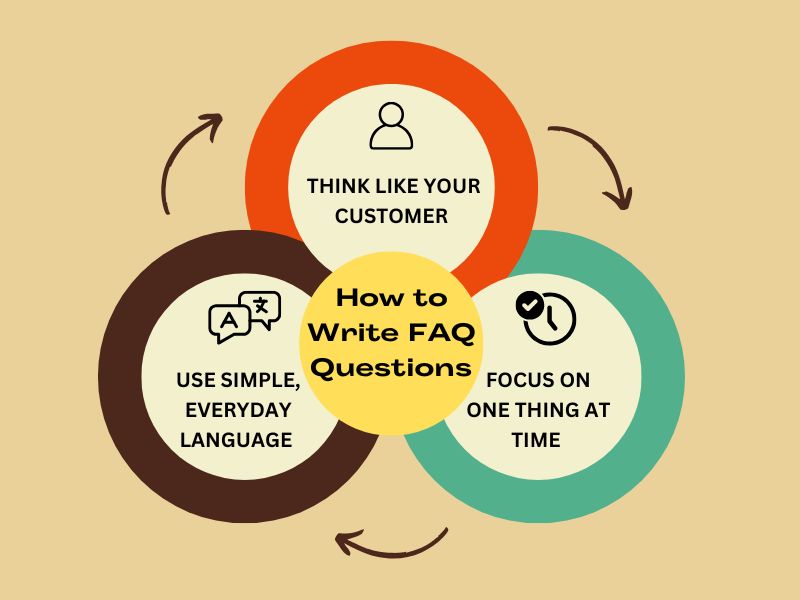Most people have visited a website and gone straight to the FAQs to get quick answers. That little section can save time, clear up confusion, and even turn a visitor into a paying customer. Learning how to write FAQs is more than a skill; it’s a way to create a smoother, friendlier experience for anyone visiting your site.
Think of FAQs as a digital front desk. They welcome visitors, answer common questions, and guide people to the right information without anyone needing to make a call or send an email. FAQ questions for business can work around the clock.
The process of writing great FAQs is simpler than it seems. With a bit of planning, the right tone, and some personality, your FAQ section can become a helpful, engaging, and customer-friendly resource. This guide will walk through the steps, share practical tips, and include examples to make the process easy.
Understanding the Audience
Before figuring out how to write FAQs, it’s smart to know who will be reading them. An FAQ section works best when it speaks directly to the people who visit your site. That means paying attention to the words they use, the problems they face, and the answers they want.
Start by collecting real questions from emails, social media messages, support calls, and even casual conversations with customers. These insights are gold for customer research because they reveal exactly what your audience cares about. A single question often reflects what many others are thinking.
Consider the different types of visitors. A first-time customer might ask basic questions like, “How do I order?” while a returning client might want details on bulk pricing or special offers. By grouping these needs, you can create an FAQ section that feels personal and easy to navigate.
How to Write FAQ Questions?
Good FAQ questions are easy to read, quick to understand, and sound like they came straight from your customers. The clearer the question, the faster people will find the answer. Here’s how to shape questions that actually help.

Think Like Your Customer
Imagine standing face-to-face with someone asking about your product or service. Use the same tone and wording they would use. Keep the question short, friendly, and focused.
Use Simple, Everyday Language
Skip technical terms unless your audience expects them. Instead of asking, “What dietary restrictions can be accommodated?” go with, “Do you make gluten-free cakes?” The simpler version is warmer and easier to read.
Focus on One Thing at a Time
Each FAQ should tackle a single topic. Avoid bundling two questions together, such as “How do I order, and what payment methods do you accept?” Splitting them makes scanning effortless.
How to Write a Good FAQ Answers?
An FAQ answer should make the reader feel, “Ah, that’s exactly what I needed.” Clear, direct, and helpful responses keep people engaged and prevent frustration.
Start with the Answer
Don’t build suspense; give the solution in the first sentence. This saves readers time and builds trust right away.
Keep It Concise
Aim for short paragraphs or bullet points. People scan FAQs, so break information into easy-to-digest chunks.
Add Helpful Details Without Overloading
Include the most important facts, then link to a longer page if needed. This keeps the main answer simple while giving curious readers more depth.
Use Bullet Points for Steps or Lists
When explaining a process like returning an item, bullet points make instructions easy to follow at a glance.
Match Your Brand’s Voice
A law firm might need a formal tone, while a coffee shop can be casual and playful. The style should feel consistent with the rest of your site.
Tips for a Good FAQ Section
A well-organized FAQ section can feel like a friendly assistant who knows exactly what people need. The right structure, tone, and design make all the difference in keeping visitors engaged and informed.
Group Similar Questions Together
Organize questions into categories such as “Orders,” “Payments,” and “Shipping.” This helps people quickly find what they’re looking for without scrolling through unrelated topics.
Put Popular Questions First
Lead with the questions you hear most often. This not only saves visitors time but also reduces the number of repeat customer support inquiries.
Keep Answers Short but Useful
An FAQ answer should give enough detail to solve the problem without overwhelming the reader. If more explanation is needed, link to a detailed page.
Use a Friendly, Consistent Tone
Write in a way that matches your brand’s personality. Whether casual or professional, keep it consistent so the section feels cohesive.
Make It Easy to Navigate
If you have a long list of FAQs, use collapsible sections or a search bar. These features help readers find answers faster and keep the page tidy.
Examples of FAQ Questions for Business
Sometimes the hardest part of learning how to write FAQs is figuring out which questions to include. The best way is to start with the ones customers ask the most, then add questions that clear up common concerns before they even arise.
About the Business
- What products or services do you offer?
- Where are you located?
- Do you have physical stores or only sell online?
Ordering and Payments
- How do I place an order?
- What payment methods do you accept?
- Can I change my order after it’s placed?
Shipping and Delivery
- Do you offer free shipping?
- How long will delivery take?
- Can I track my order?
Returns and Refunds
- What is your return policy?
- How do I start a return?
- When will I get my refund?
Special Services
- Do you offer bulk discounts?
- Can I request a custom order?
- Do you have gift cards?
These sample questions can be tailored to any industry. By covering different categories, you make sure visitors find answers without having to search elsewhere.
Conclusion
Writing a great FAQ section isn’t about cramming in every possible question; it’s about giving clear, helpful answers to the ones that matter most. When you understand your audience, use their language, and keep things organized, your FAQs can become one of the most valuable parts of your website.
Think of it as a quiet team member who works all day and night, answering questions, building trust, and guiding customers. Well-crafted FAQ questions for business save time for visitors and your team, while making your site feel friendlier and more reliable.
By following these tips on how to write FAQs, you can turn a simple page into a powerful tool that enhances customer experience and supports your overall branding strategy. Start small, keep it updated, and watch how much easier it becomes for people to connect with you.
FAQs
1. What is the purpose of FAQs on a website?
They answer common customer questions quickly and build trust.
2. How do FAQs improve customer experience?
By reducing confusion, saving time, and providing clear solutions.
3. What are best practices for writing FAQs?
Keep answers concise, simple, and focused on customer needs.
4. Can FAQs help with SEO?
Yes, well-structured FAQs improve rankings and drive organic traffic.
5. Should FAQs be updated regularly?
Absolutely, updating keeps them accurate and relevant to customer queries.


















Leave a Comment